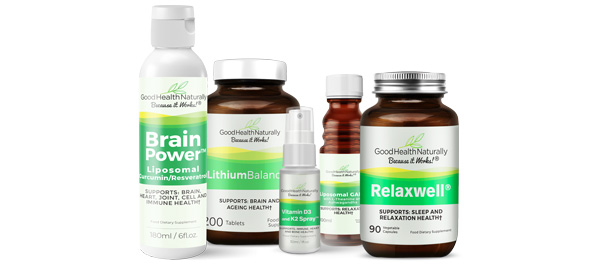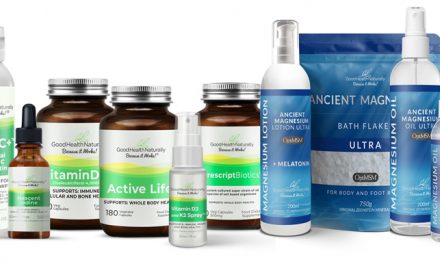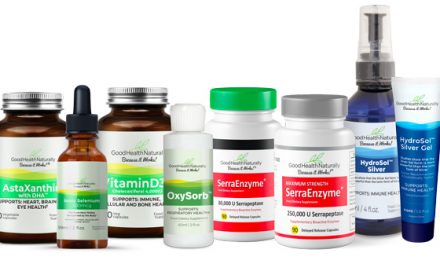Mental health is a topic that was rarely discussed a few years ago but is now making headlines around the world, especially since 2020.
As mental health issues are on the rise, it’s important to look at the reasons why, along with natural solutions that may help to improve your overall mind and wellbeing.
Government figures in the UK show that one in six young people aged from 6 to 16 had a probable mental health condition in 2021, up from one in nine in 2017. This increase also coincided with a fall in referrals during 2020, as people struggled to access services.
New research is now suggesting there are an increasing number of young men in the UK who are experiencing long-term unemployment as a result of mental health issues.
According to the charity Young Minds, this could lead to ongoing mental health issues, with three-quarters of life-long mental health problems developing before the age of 24. This has a huge impact on young people and their prospects.
Older people are also more vulnerable to suffering from anxiety or depression due to bereavement, physical disability, illness, loneliness or prolonged periods spent in isolation. According to Age UK, more than 2 million people in England over the age of 75 live alone, and sadly, more than a million older people say they go for over a month without speaking to a friend, neighbour or family member.
For all of the above reasons, it’s never been more important to talk about mental health and get the help and support that yourself or your loved ones may need.
An essential part of this is learning to take care of your own mental health too. Following a healthy lifestyle and ensuring you get the right nutrients is therefore essential to maintaining peace of mind.
Here are some simple solutions to follow that can support your mental health…
Mental Health Support
1. Talk about your feelings
It’s important not to ‘bottle up’ your thoughts and feelings. Talking isn’t a sign of weakness, it helps you to take charge of your emotional wellbeing so you can learn healthy coping mechanisms to feel supported and less alone. Talk with a friend or family member who you feel you can trust. You may also want to consider talking with a therapist.
2. Stay Active
Getting into a routine with regular exercise can help to boost your self-esteem, while helping you to concentrate, sleep and feel better. Exercise has also been shown to keep your brain and other vital organs healthy – and provides a significant benefit towards improving your mental health.
3. Eat Well
There are strong links between what we eat and how we feel. Caffeine and sugar can have an immediate effect on your emotional wellbeing. For this reason, it’s recommended that you avoid these for best health. A healthy diet includes lots of different types of fruit and vegetables, nuts and seeds, oily fish and plenty of water to stay hydrated. Avoiding starchy carbohydrates and wholegrain cereals especially bread, pasta, cereals and processed foods is also recommended for achieving good health.
4. Take a Break
A change of scenery or taking a break can do wonders for your mental health. This might mean taking a five minute break from kitchen chores or going on a walk during your half-hour work lunch break, or enjoying a weekend away to explore somewhere new. Getting into the habit of doing simple deep breathing exercises can help you to relax, while yoga or meditation can help your body to unwind.
5. Ask for Help
We can all get tired or overwhelmed sometimes, so it’s essential to learn to ask for help when needed. If things are getting too much and you feel you can’t cope, it’s important to ask someone for help. Family or friends may help but there are also local services available where possible.
Along with the above advice, it’s also worth considering the following nutrients to support your best mental health.
Nutrients For Best Mental Health
L-Tryptophan – As an essential amino acid, L-Tryptophan can help the body to make proteins and certain brain signaling chemicals. Your brain can also change L-Tryptophan into a brain chemical called serotonin which can help to control your mood and benefit sleep.
Curcumin – Being an active compound, Curcumin has antioxidant and anti-inflammatory properties that have the potential to improve a range of health conditions – including depression. Research shows that Curcumin supplements can help to provide natural relief for symptoms of depression compared to those taking a placebo. Curcumin is also beneficial for people with mild age-related memory loss. You can read more here.
Vitamin D3 – Research shows that not getting enough Vitamin D3 can lead to depression-like symptoms. Several studies suggest that Vitamin D3 can improve moods and serotonin levels, thereby helping to reduce symptoms of SAD as well.
Resveratrol – This polyphenol compound provides antioxidant, anti-inflammatory, and neuroprotective properties that can regulate brain function and improve the behavioural factors associated with learning, anxiety, depression, and memory. Its anti-inflammatory effects also make it beneficial for skin health, and Alzheimer’s disease.
Lithium Orotate – As a safe and natural mood stabiliser, Lithium can promote healthy brain chemical responses. It’s recommended to take Lithium Orotate for balanced moods. Onе vеrу recent ѕtudу fоund thаt еvеn whеn vеrу lоw dоѕеѕ оf lіthіum are аdmіnіѕtеrеd thеу саn halt advanced Alzhеіmеr’ѕ pathology аnd rесоvеr lost cognitive аbіlіtіеѕ.
GABA – By acting as a neurotransmitter, GABA’s natural function is to reduce neuron activity to which it binds calming nervous activity. This then creates feelings of relaxation and tranquility in your self, along with a general sense of wellbeing. GABA enables both the body and mind to relax and sleep soundly. Along with boosting the immune system, studies suggest that taking a GABA supplement may enhance overall immunity in people suffering from serious mental stress.
Nutrient Recommendations

Relaxwell® – A unique combination of four key nutrients including L-Tryptophan, L-Theanine, plus Vitamins B3 and B6 to support stress, relaxation and sleep. Suitable for vegetarians and vegans. Available from Good Health Naturally.
Liposomal GABA™ with L-Theanine and Ashwagandha – Provides powerful and fast acting support thanks to Liposomal GABA that works as a “calming” neurotransmitter, along with L-Theanine and Ashwagandha to calm and balance moods, providing anxiety relief. The addition of Ashwagandha can support a better sleep. Suitable for vegetarians and vegans. Available from Good Health Naturally.
Lithium Balance™ – Lithium Orotate can support healthy mood balance and healthy brain chemical responses. May be a possible healthy alternative to anti-depressants. 100% natural, safe and effective. Suitable for vegetarians and vegans. 200 tablets. Available from Good Health Naturally.
BrainPower™ Liposomal Curcumin and Resveratrol – Curcumin and Resveratrol can provide anti-inflammatory protection and support for a range of health conditions including brain health and the body’s normal immune response. Suitable for vegetarians and vegans. 180ml/6 fl.oz. Available from Good Health Naturally.
Vitamin D3 and K2 Sublingual Spray™ – An ‘all in one’ vegan friendly sublingual spray providing the active forms of Vitamin D3 and K2 in a convenient travel-sized bottle. Vitamin D3 and K2 contribute towards a healthy immune system. Research shows that Vitamin D3 can increase serotonin levels which may boost moods. Dosage can be altered to suit individual requirements. Suitable for vegetarians and vegans. 30ml/1 fl.oz. Available from Good Health Naturally.
Lifestyle Recommendations
Research shows that having a healthy mind begins with building a strong immune system. The gut and brain are interconnected and gut bacteria play a key role in both your moods and mental health.
This is why it’s important to get immune healthy first. Along with following a detailed nutritional supplement plan for best mental and mood support as listed above, consider the immune supporting lifestyle solutions and following the fundamental health care rules…
Never Forget The Fundamental Health Care Rules
All of these rules are detailed further in my eBooks that you can view and Download Here
1. Breathing properly – Oxygen is the most critical element for life and health since most people cannot live more than 5 minutes without it. Oxygen is critical for healthy cells, and the regeneration of your body and is the essential fuel for your immune system. You can improve the oxygenation of the body by learning to breathe from the diaphragm (tummy). I also recommend laying down instead of sitting down.
2. Sit less – Those who sit for more than 8 hours per day are more likely to have health problems and die younger than those who sit for less than 3 hours per day. When you are sitting your breathing is the least effective. If you are unable to stand, laying down is better than sitting.
3. Drink Plenty of Water (with Sodium Bicarbonate) – Water is the second most critical nutrient and most people would die after 7 days of drinking no water. Consume around 6-8 glasses of pure water over the day (with a small amount of Bicarbonate of Soda and Organic Liquid Trace Minerals added for extra benefits). Tip: Prepare the bottles in the morning and take them with you or leave them on the table to remind you.
4. Walk More – Walking is vital for two reasons; improving breathing and intake of oxygen and circulating blood around the body. The heart is not a pump and does not pump blood around the body it is a circulator and needs walking movement to work efficiently. To get the most benefits; walk at a good pace with longer strides whilst keeping your pelvis slightly forward and tucked in at the bottom of the spine. If you cannot walk, then lay on your back with your legs elevated and cycle your legs every few minutes.
5. Stop eating all grains, cereals, and other high-sugar foods and drinks – Research indicates that the consumption of wheat contributes to the growth of pathogenic bacteria in our gut, adding to the mounting concern that grain/cereal (often contaminated with Roundup herbicide) is one of the worst types of foods to consume for gut health. The foods to avoid include; high-sugar foods and drinks, breads, pastry, biscuits, breakfast cereals, rice, potatoes, parsnips, and wheat-based pasta. See alternative recipes at my www.ReallyHealthyFoods.com, and select Keto for the best health options.
6. Eat more greens, other colourful vegetables, and dark-skinned fruits – Organic options are best if possible. Many of the discount supermarkets offer organic foods at low prices.
7. Take Nutritional Supplements – Your body and cells need specific nutrients to function optimall. Most of the critical vitamins and minerals are no longer in foods in sufficient quantities. This is particularly important for if/when children are planned, and as we age. The Government Nutritionists will claim that eating a balanced diet contains all of the nutrients needed. This is simply not true. Most critical minerals are dangerously deficienty.




